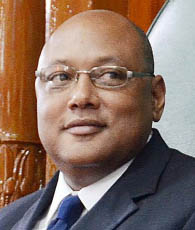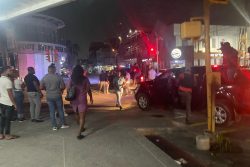Speaker of the National Assembly Raphael Trotman yesterday ruled that Attorney General Anil Nandlall’s proposed amendments to Leader of the Opposition David Granger’s Motion calling for a Commission of Inquiry on criminal violence from 2004 to 2010 were unacceptable.
Further, the Speaker has recommended a number of changes to Nandlall’s proposed amendments – some of which he described as scandalous – if he wants them to proceed, saying that the amendments in their original form offended Standing Orders 26 (b), (c) and (d).

Granger was to have moved the Motion last Thursday in Parliament seeking to have government appoint a Commission of Inquiry to probe criminal violence from 2004 to 2010 ranging from the killing of Minister Satyadeow Sawh to the massacres at Lusignan, Bartica and Lindo Creek in 2006. However, he declined to proceed with it.
Speaker Trotman in his ruling explained why it was that he could not allow the amendments to the Motion in their original state.
“On Thursday January 10, 2013, after convening the sitting for the day, I observed a document placed before me entitled, ‘Amendment to Motion – The Appointment of a Commission of Inquiry to Investigate the Incidence of Criminal Violence from 2004 to 2010,” he said.
“I refer in particular, to the references to sitting and former Members of Parliament, and other former and current leaders and superior officers of political parties and the disciplined forces, and their linkages to criminal gangs; these, in my considered opinion, offend Standing Orders 26 (b), (c) and (d),” the Speaker ruled.
The Speaker stressed the point that the submission of a Motion is no guarantee that it will be placed on the Order Paper in its original form “as there has to be a process to ensure that the Motion meets the established standards set out in Standing Order 26.”
He said that following approval by the Speaker, a Motion is placed on the Order Paper by the Clerk for debate. “Amendments to Motions are expected to follow the same process for approval as the substantive Motion, and are expected to be submitted in sufficient time, before the date and hour of the debate of the substantive Motion, so that they could be examined to ensure that the Standing Orders are complied with,” said Trotman.
He said that some elements of Nandlall’s proposed amendments are self defeating, since they state as facts the very issues they call for an inquiry into. “Apart from the names of persons inserted, and that some of them are not present to mount a defence of their characters, the amendments also make statements that appear to be ‘fact’ and yet seek to have a Commission of Inquiry inquire into these matters,” he said.
“In the circumstances of the foregoing, the amendments are disallowed. Recommended changes to the amendments have been made,” he said. He stressed that Nandlall’s submitted amendments, not being approved, and contained in documentary form, are not to be considered as a document officially emanating from the National Assembly of Guyana,” he said.
Trotman pointed out that Nandlall was free to make changes to his amendments to Granger’s Motion or withdraw them entirely if he so chooses.
Contacted last night, Nandlall said that he will be furnishing a response to the Speaker’s ruling today.
Among the changes Trotman recommended for Nandlall to the proposed amendments was the removing of all clauses that mentioned names of persons and media houses and accusing them of being criminally linked, replacing them with “known figures and some media houses.”
Trotman also recommended the substitution of a part of the proposed amendments with “That the President considers including in the terms of reference of the Truth and Reconciliation Commission the following: Was there a connection between media houses and the criminal gangs? And were there any linkages between public officials and the criminal gangs?”
The Speaker had chastised Clerk of the National Assembly Sherlock Isaacs for not allowing him sufficient notice of what he said were extensive amendments from Nandlall.
Contacted for a comment last night, Granger said that he was not required to give a reason for not proceeding with the debate on his Motion and so he gave none in the House. However, he said that it was his opinion that the spirit of reconciliation which pervaded the air during the debate and adoption of a Motion in 2003 which resulted in the establishment of the Disciplined Forces Commission was absent on Thursday. He recalled that the 2003 Motion which established the DFC saw wide support from both sides of the House.
Granger noted that such motions are not meant to be attacks against any person or Government in particular but meant to be an act of reconciliation. “[On Thursday] I did not feel as though there was a mood of national reconciliation based on those vitriolic amendments [which I feel] would have done more harm to national unity,” Granger said.
With regard to the period which the Motion covers, Granger said that he had originally wanted the Commission of Inquiry to look at the period beginning in 2000 up to 2010. However, he said that the Parliament Office changed this to 2004 to 2010.









